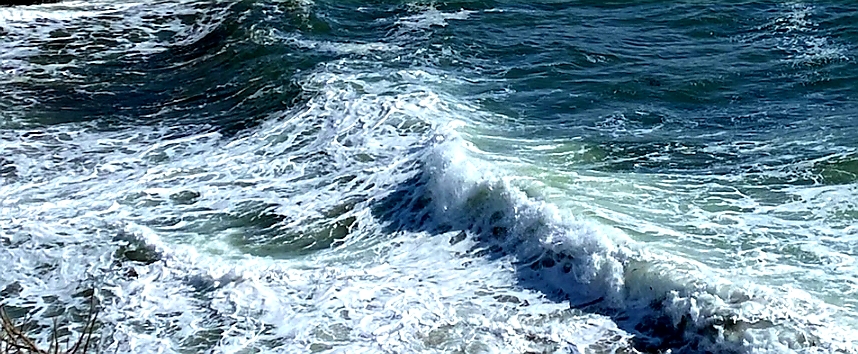Locust House Variations, A Weekly Column by Adam Gnade, “Moss Landing”
People are coughing in the San Jose airport. You sit and listen long enough and you hear a cough—a shallow, dry one or something wet and deep in the lungs.
I hold my breath each time I hear a cough even though I’m in a mask and even though I know it does no good.
Outside the big wall-length windows of our gate are low clouds in a cottony, soft clump, and beyond that a dim strip of gray mountains, planes small and white, set across the black tarmac like toys.
Yesterday—sea caves at Wilder Ranch north of Santa Cruz with hanging ferns and gold sand beaches below cliffs standing as tall as buildings. Open sea—dark blue and tousled white, a wind blowing the waves ragged as they reached shore, and the surf hitting the black rocks with a great whooshing plume and spraying upwards like a whale’s spout.
Before that—sand dunes at Moss Landing and Alison and I walking on the beach where we find a young bird foundering at the waterline—a cormorant. It’s battered to hell, falling in and out of consciousness, dying as the tide washes it up the shore and rolls it back down.
Alison picks the bird up and we take it to the sand dunes above the beach and make a safe, warm place for it out of the wind. It’s in bad shape, and it’s clear it doesn’t have long, but at least we can give it a final comfortable nest, something out of the elements, away from the cold water and hard, ceaseless wind.
Satisfied it’s safe, we leave the bird alone and walk up the beach, talking above the roar of the surf about the past week, a day in San Diego seeing friends, the flight up to Santa Cruz, then Cannery Row, Pleasure Point, the strawberry fields, my cousin’s wedding.
We find a good spot to sit and read our books. Mine, Nate Marshall’s Finna. Hers, a sci-fi novel called The Employees by the Danish writer Olga Ravn.
A few minutes after we’ve settled down, we see a strange woman up the beach, tall and thin like a scarecrow, her dark clothes flapping in the breeze. She’s found the bird and carried it back down to the waterline and now she’s dancing around it, clapping her hands in its face, whipping a towel at it, spinning circles in front of where it fights over and over to stand, falling to the side each time.
“What is she doing?” asks Alison, shutting her book and setting it on the sand next to her.
I squint at the scarecrow woman. “A ritual? Some kinda stupid hippy shit?”
“She’s torturing that poor thing,” says Alison.
“Is she clapping in its face? What the fuck.”
“She’s clapping.”
“Fucking hell. Jesus Christ.”
In the distance we can see the bird pecking at her as she claps in its face; defending itself, fighting to the last.
“Maybe she’ll stop,” says Alison.
“Yeah. I hope.”
We watch for a few minutes and then I can’t anymore. I get up and stomp down the shoreline in a rage, unsure of what I’m going to do.
I get close and the woman is holding the bird wrapped in her towel and she’s jogging circles, shaking her head side to side, shouting rhyming gibberish.
“Bleeeeea to cooma booma!” she shouts. “Blee ah at coota cooga looga!”
“Fish and Game Department!” I shout, pointing at my chest like there’s a badge there. “Give me the bird!”
It’s a lie, but a Fish and Game officer would have the authority to take the bird and who knows whether they wear uniforms or normal clothes like mine. I don’t, and I imagine she doesn’t either. My plan is to get the bird before the woman has a chance to think it over.
She stammers, sputters something unintelligible, and then the bird is in my arms and I’m walking back to Alison.
As I walk, I look behind me and the woman runs in the opposite direction up the shore toward the dirt lot, clutching her bag and towel to her chest.
That was two days ago.
Then—wind, sun, a dying bird in my arms as I walked back to Alison.
Now—an instrumental acoustic version of Eric Clapton’s “Cocaine” over the airport speakers and people from our flight lining up at gate 9. San Jose to Dallas. Dallas to Kansas City.
Then—the noise of the surf, the sand dunes, salt air.
Now—out the windows of the terminal a plane rising off the tarmac—small, then gone.
